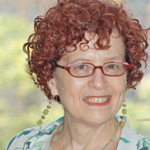Director of Business Development, Atypon
 First, tell us a bit about yourself (hometown, current locale, family, hobbies, community involvement?).
First, tell us a bit about yourself (hometown, current locale, family, hobbies, community involvement?).
I was born in Washington, DC and grew up in Louisville, Kentucky and then returned to the Maryland suburbs for Jr. High and High School. I left Louisville saying “you’all” but that was the extent of my Southern accent since my parents were both New Yorkers.
My parents couldn’t wait to leave NYC when they married, but I have found my true home here. I love the arts, the energy, and the diversity of the people. I live in the charming landmark Murray Hill neighborhood and am an active member of the Murray Hill Neighborhood Association.
I go to the opera, classical concerts, and museums. My main hobby is playing and studying classical piano, which I returned to 13 years ago after studying as a child. I’m blessed to have my mother’s mahogany Steinway S (Baby Grand) that I grew up playing and that now graces my large studio apartment.
Describe some of your responsibilities, and how you or your organization fit into the scholarly communications web.
As Director of Business Development at Atypon’s NYC office, I am responsible for sales in the Americas, primarily the US, though I’m pleased to have worked with several Canadian publishers. I enjoy speaking and meeting with publishers: discussing their current online publishing platforms, identifying unmet objectives, and seeing how Atypon’s Literatum platform can help. Atypon has been assisting publishers achieve their digital publishing strategies—particularly with monetizing content and serving members—since the Literatum platform was launched in 1999.
For example, we began working on our mobile solution, Literatum for Mobile, over 3 years ago and launched 2.0 earlier this year. It extends the benefits of an innovative approach to mobile delivery, including enhanced device pairing and reflowable PDFs enabling easy reading of PDF-only content.
I particularly enjoy finding solutions for societies and am excited about the upcoming launch of the American Public Health Association site. It will deliver enhanced topical collections of articles culled from the American Journal of Public Health. These subspecialty entry points will make it easier for public health professionals to find information most relevant to them.
Publishers—whether non-profit or commercial—use Literatum to retain and grow their revenue. Atypon is constantly developing new tools to achieve this critical objective. For instance, we are deploying another innovative tool called Sales Manager which will alert publishers to opportunities and threats from their institutional subscriber base and provide rich access to their usage and behavioral data. Armed with this added intelligence, publishers can create new products and offers for target markets.
I feel at the center of the scholarly publishing universe working for a software development company focused on scholarly publishing—much more, in fact, than when I worked in publishing proper, as I recount below.
What career path led to your current position?
I spent 20 years selling and marketing to libraries in positions at Oxford University Press, Wiley, and Henry Holt. As Library Sales Manager at Wiley I became sensitive to the needs of academic libraries even when those were at variance with publishers’ priorities.
When digital hit at the end of the ‘90s I was lucky enough to get laid off from Henry Holt and jumped at the opportunity to open the North America office for CatchWord, an early provider of platform solutions for scholarly publishers. CatchWord did well so I was soon working for Ingenta who bought Catchword in 2000.
Then I heard about a vendor whose publishing platform put publishers in control of their online publishing program. From my experience in publishing that seemed the right direction. After all, why should outsourcing mean loss of control when being online can enable a hands-on approach and greater innovation? So in 2003 I joined Atypon.
My publishing experience in library sales and marketing and my active involvement in industry activities—at the ALA, the Charleston Conference, SSP, the AAP/PSP, and NISO—have been a great preparation for my job at Atypon.
Where do you see scholarly communications heading, and what new directions interest you most?
Scholarly communications will be around as long as there are scholars and research and the need to share with others; thankfully, IMO, forever.
Trends such as publishing by libraries, institutional repositories, new citation indices, mobile delivery, and social networks will increase. E-Books—both scholarly and trade—will continue their double digit increases, following the primacy of journals online.
Scholarly societies will continue to struggle with delivering more value to their members who are also their authors. Some may choose to partner with commercial publishers to obtain financial security in uncertain times, though this choice might mean a loss of brand and independence.
In my particular space, I am interested in finding the best ways to leverage technology to help publishers achieve their business goals.
What advice would you give to people interested in a career in scholarly communications? What new roles or opportunities do you see emerging in the field?
I have been pitching scholarly communications as a career to students from Swarthmore, my alma mater, and to any others who say they want to be “in publishing.” I tell them that they can get a leg-up from publishing courses or the boot camps offered by trade associations. I tell them that a major in English is always fine – many in publishing have that, though mine was in Sociology/Anthropology – but that studying science can be a good entrée into an STM organization. And that a computer science or digital media background is excellent too since that is the present and the future of publishing.
It’s interesting that few I speak to think of scholarly publishing and communications when they think of “publishing” so there’s a huge opportunity to get the word out. It’s a great life!
Profiled December 2011

